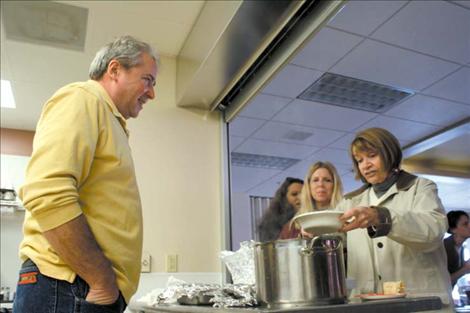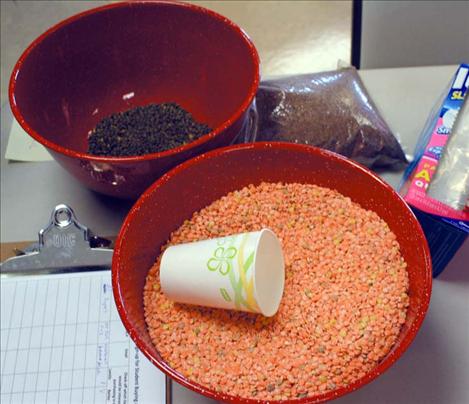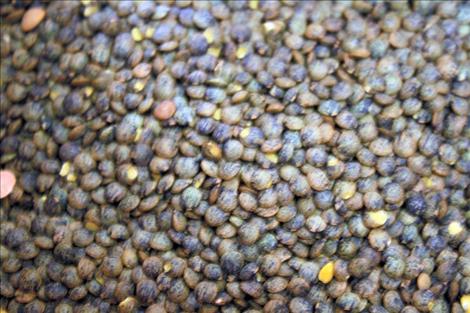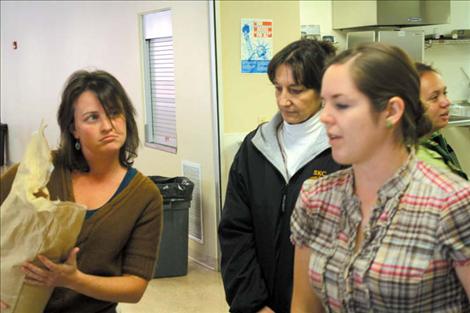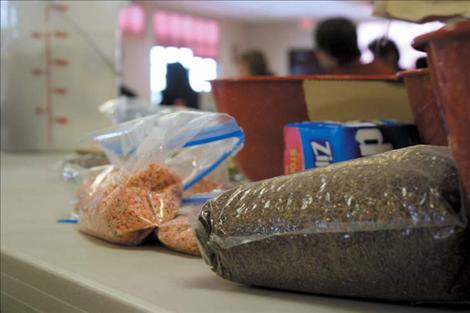SKC mulls plans for greenhouse
Hey savvy news reader! Thanks for choosing local.
You are now reading
3 of 3 free articles.
PABLO — Students, faculty and community members filed into Salish Kootenai College’s Camas room last week to hear a presentation on community sustained agriculture as it relates to the college’s recently-built greenhouse.
Those in attendance were served a beef stew made with locally grown and raised food products while listening to presentations from SKC Extension Office Director Virgil Dupuis, Western Montana Growers Coop member Amy Pavlock and AmeriCorps VISTA member Shay Farmer.
All speakers hailed from different backgrounds and work experiences, but all have one thing in common: they want to make locally sourced and processed foods available to more people, because it strengthens the local economy and is much healthier for consumers.
“From what we can tell from assessing their food landscape, there are incredibly limited options for food, and even more limited options for healthy eating,” said Mission Mountain Food Enterprises Farm-to-Institution program coordinator Lindsay Howard.
Three Wolves, the SKC cafeteria, is only open for breakfast and lunch on weekdays and closed on weekends. SKC students who live on campus have few food options other than processed, pre-packaged gas station food.
“There’s a grocery store, but I don’t know if any of the students know how to cook. That’s the point,” Howard said, adding that during a workshop, 100 percent of attending SKC students had never heard of a lentil.
“There’s a huge opportunity here to provide them with resources to help them begin the adult stage of their lives by buying groceries and cooking food. I think it would be cool to prepare them for that,” she said.
With this in mind, Farmer, Howard and Dupuis began outlining the above initiatives last year.
According to Dupuis, SKC has had some form of greenhouses for the past 15 years.
While these greenhouses were used to grow native plants for private residents and Confederated Salish and Kootenai Tribes community restoration projects, no vegetables to speak of were ever grown.
Dupuis said the process to construct a fully functional greenhouse at SKC took nearly a year and a half and was completed this summer. The new greenhouse is awaiting heaters and lights, but should be operational by mid-March.
“We want to use it to improve our growing capacity,” Dupuis said. “We want to see if we can support students due to the high cost of food. It hasn’t been completely decided where the food will go, but the concept is to share it with those students who contributed.”
Several large universities throughout the country have built greenhouses that are staffed by agriculture students. Once the crops are harvested, they are given to the culinary students, who then prepare breakfast, lunch and dinner for the dormitory cafeterias. When asked if SKC would adopt a similar model of self-sustained food production, Dupuis said, “If that evolves at the college, I will certainly expend my efforts towards making that a reality.”
In addition, Dupuis hopes to expand the opportunities for student research and allow student groups from the rest of the college to come in and learn about agriculture.
“We don’t have a formal community sustained agriculture or marketing plan yet. I want to see what our students have to say about it,” Dupuis said. “Student support has gone down in the last couple of years.”
Dupuis said low enrollment numbers across the state and less student intern money and grants have contributed to the decline in interest. Even so, Dupuis said growing food a good project and should be a fun and interesting learning experience.
“We’re probably moving into a new area with it. We’re going to be looking more seriously at alternative crops and animal agriculture in the future,” he said.
Farmer said the long-term goal is for SKC students and the community to have access to healthy, affordable and local foods while setting up a sustainable system for students and faculty to have access to low-cost foods, food processing and cooking classes. In addition, Farmer said she wants to take the greenhouse a step further to help students to understand that there are more options available to them — like a career in agriculture.
“The food day was really just the beginning and the kick-off,” Farmer said. “Hopefully, more things are coming.”















